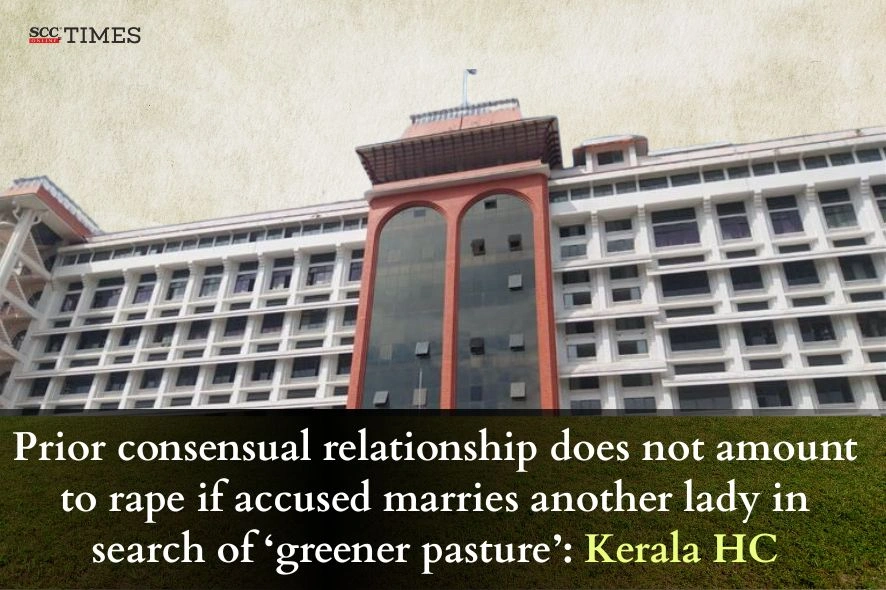Kerala High Court: In a case revolving around the question whether an eight-year long consensual relationship, allegedly induced by a promise of marriage, could be classified as rape, a Single Judge Bench of G. Girish, J., observed that the facts did not satisfy the essential requirements for prosecuting the accused for the offence of rape, and therefore, the proceedings against the accused were unsustainable and liable to be quashed.
Background:
In 2009, the accused befriended the de facto complainant, a widow with two children, by calling her over mobile phone and rendering financial assistance to her. He came to the room which the widow was occupying in connection with her business and indulged in a sexual relationship after making her believe that he would marry her. Following her husband’s death in 2013, the accused resided with her and continued the relationship. At one point, he even tied a knot in her gold chain before a lamp and candle, making her believe that he had married her.
Later, she found out that he had married another woman, but he continued to assure her that she alone was his wife and continued the physical relationship with her. The widow also told the accused’s wife that even before he had married the woman, he was living as husband and wife with her. But on 04-11-2017, the accused called and informed the widow that he did not want to continue the relationship, and thereafter, she alleged the offences under Sections 493, 496, and 376 of the Penal Code, 1860 (‘IPC’).
However, the accused contended that the relationship was consensual and that the offences alleged were not legally sustainable. He denied the accusation that he had offered to marry the de facto complainant.
Analysis and Decision:
The Court observed that the prosecution for offences under Sections 493 and 496 IPC incorporated in the final report is, prima facie, not maintainable as the Court concerned is proscribed from taking cognizance of the said offences except upon a complaint made by a person aggrieved by the offence as provided under Section 198 of the Criminal Procedure Code, 1973 (‘CrPC’), and therefore, the accused could not be compelled to face trial for the offences upon a final report filed by the police under Section 173(2) CrPC.
The Court held that the sexual relationship between the accused and the widow was consensual and that the said relationship could not be classified as rape as she had maintained the relationship even when her husband was alive, and continued it for years after his death, knowing that the accused had married another woman in 2014.
The Court opined that the consent given by the prosecutrix to sexual intercourse with a person with whom she is deeply in love with, on a promise that he would marry her, cannot be considered to be given under a misconception of fact. A false promise is not a fact within the meaning of the Code, and a promise to marry without anything more will not give rise to a misconception of fact under Section 90 IPC. However, the position will be different if it is shown that the accused, with a view to eliciting the victim’s assent, gave the false promise of marriage, without having the intention to marry her, and made the victim submit herself to him.
The Court relied on Deepak Gulati v. State of Haryana, (2013) 7 SCC 675, wherein the Supreme Court held that “there is a clear distinction between rape and consensual sex and in a case like this, the Court must very carefully examine whether the accused had actually wanted to marry the victim, or had mala fide motives, and had made a false promise to this effect only to satisfy his lust, as the latter falls within the ambit of cheating or deception. There is a distinction between the mere breach of a promise and not fulfilling a false promise. There may be a case where the prosecutrix agrees to have sexual intercourse on account of her love and passion for the accused, and not solely on account of misrepresentation made to her by the accused, or where an accused on account of circumstances which he could not have foreseen, or which were beyond his control, was unable to marry her, despite having every intention to do so”.
The Court observed that the consistent view being followed is that the absence of consent cannot be presumed in every case where the prosecutrix alleges that she indulged in sexual intercourse with the offender believing the offer of marriage made by him. For the offence of rape, it must be established that from the very beginning the accused did not have any intention to marry her and that the offer of marriage was made as a ploy to make her surrender to him to satiate his carnal desires.
The Court observed that the long cohabitation of more than eight years, where the parties behaved like husband and wife, clearly indicated consensual sex, and the fact that the accused went in search of a greener pasture for giving vent to his promiscuous sexual urge, and started a new relationship in the nature of marriage with another lady, by itself, will not bring his prior relationship with the victim within the meaning of rape.
Consequently, the Court held that the proceeding initiated against the accused in connection with the commission of rape, was prima facie unsustainable. The Court allowed the petition and quashed the proceedings against the accused, holding that the final report and accompanying records relied on by the prosecution failed to bring out the essential requirements for the alleged offence under Section 376 IPC.
[Pradeep v. State of Kerala, 2025 SCC OnLine Ker 12351, decided on 17-11-2025]
Advocates who appeared in this case:
For the Accused: B. Mohanlal, Advocates.
For the Respondents: Seena. C, Public Prosecutor, Ajith Krishnan, Advocate.




